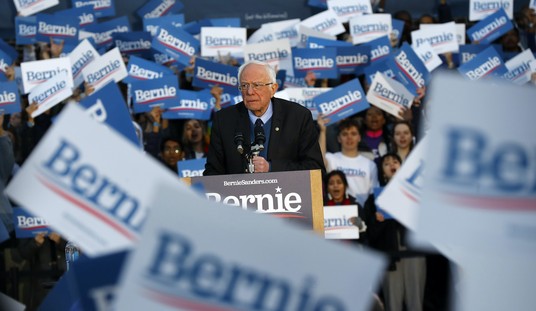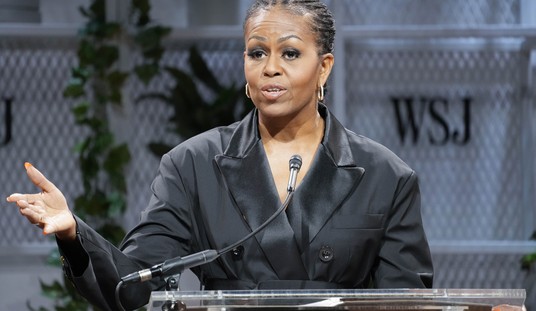There’s nothing quite as damaging as the backfire from an anticipated gotcha moment, as Meet the Press host Chuck Todd discovered yesterday. In a discussion about immigration policy, incoming Senator Tom Cotton (R-AR) talked about the economic and security implications of a poorly-secured southern border. Cotton didn’t specifically mention terrorism (although he did specifically mention “border security”), and Todd dropped audio from a campaign call Cotton had made in which he argued that the lack of border security could create an opening for terrorists. “Some would argue that’s fear mongering,” Todd said, but Cotton made it clear that he was working from the facts (via Power Line):
CHUCK TODD: Now, you brought up one other issue during the campaign. I want to ask you about it. Let me play some audio from you about the immigration issue.
REP. TOM COTTON (ON TAPE): First off, we have a lot at stake to collaborate with drug cartels in Mexico that have clearly shown their ready to expand outside the drug trade into human trafficking and potentially even terrorism. They could infiltrate our defenseless southern border and attack it right here in places like Arkansas.
CHUCK TODD: You didn’t bring up terrorism just now with me. You did in a campaign phone call. Is that just campaign rhetoric?
REP. TOM COTTON: No. I mean, Hezbollah–
CHUCK TODD: What’s the evidence?
REP. TOM COTTON: No, Hezbollah has tried to launch terrorist attacks right here in Washington D.C. They’re under federal indictment collaborating with locals in Mexico to cross our borders, attack us here. As long as our border is open and it’s defenseless, then it’s not just an immigration issue, it’s a national security issue. And we know that these drug cartels in Mexico are focused primarily on power and profit. They’ll branch out into any activity if it brings them more money and helps them consolidate control. That’s yet another reason why we have to get control of our border.
CHUCK TODD: Do you worry that rhetoric like that ends up making it even that much harder to actually get some sort of agreeable immigration bill?
REP. TOM COTTON: No.
CHUCK TODD: Because that plays to fear. That’s, you know, some would argue that’s fear mongering.
REP. TOM COTTON: Well, the Islamic State is cutting the heads off of Americans right now. And their leader has said they want to strike us here in the United States. That’s something that we should be fearful of and that we should take a strong stance against, whether it’s in Iraq, in Syria, or whether it’s securing our southern border.
Cotton didn’t make that issue up. The Department of Justice has an indictment filed on Dino Bouterse, a Suriname citizen arrested in Panama in August 2013 on charges of supporting terrorism along with drug smuggling. The South American’s indictment has been unsealed for a year. According to the DoJ, Bouterse used his position in a cocaine cartel to help alleged Hezbollah terrorists to gain access to weapons — and to infiltrate the US:
In 2013, BOUTERSE used his position to assist individuals he believed were members of Hezbollah. In exchange for a multimillion-dollar pay-off, BOUTERSE agreed to allow large numbers of purported Hezbollah operatives to use Suriname as a permanent base for, among other things, attacks on American targets. In furtherance of his efforts to assist Hezbollah, BOUTERSE supplied a false Surinamese passport for the purpose of making clandestine travel easier, including travel to the United States; began determining which heavy weapons he might provide to Hezbollah; and indicated how Hezbollah operatives, supplied with a Surinamese cover story, might enter the United States.
In June 2013, BOUTERSE and Defendant-1 met in Suriname with DEA confidential sources (the “CSes”), in a local government office. During the meeting, BOUTERSE showed the CSes a rocket launcher and a kilogram of cocaine.
Approximately one month later, BOUTERSE and Defendant-1 worked to provide transportation and security for cocaine being sent through Suriname to the United States. As a test run, BOUTERSE and Defendant-1 sent ten kilograms of cocaine on a commercial flight departing from Suriname. BOUTERSE personally verified the arrangements for the 10-kilogram cocaine shipment in a text message. The cocaine was intercepted by law enforcement officials after it departed Suriname.
In July 2013, BOUTERSE met with one of the CSes to discuss opening Suriname to the CSes’ purported Hezbollah associates.
Later that month, BOUTERSE met in Europe with one of the CSes and with two other men who purported to be associated with Hezbollah. During this meeting, BOUTERSE discussed initially hosting 30 to 60 Hezbollah members in Suriname for training and operations. He also indicated that he wanted a Hezbollah cell in Suriname to, in part, act as a kind of personal armed force. BOUTERSE confirmed his understanding that the purported Hezbollah operatives would operate in South America against American targets, and he agreed to supply Surinamese passports to the operatives—and to assist with their applications for visas to travel from South America into the United States. In addition, in response to a request for surface-to-air missiles and rocket-propelled grenades, BOUTERSE stated that he would need “two months” and that he would provide a list of what he could supply. Finally, at the July 2013 meeting in Europe, BOUTERSE agreed to create a false Surinamese passport for one of the purported Hezbollah operatives, so that BOUTERSE and the Hezbollah operative could travel to Suriname to inspect the facilities that BOUTERSE had agreed to prepare for the Hezbollah contingent.
At a subsequent meeting in August 2013, BOUTERSE delivered a Surinamese passport with false identifying information. As had been discussed at the July 2013 meeting in Europe, one of the purported Hezbollah operatives was to use the fraudulent passport to travel to Suriname. BOUTERSE indicated that everything was ready in Suriname for the arrival of the purported Hezbollah members, and that some “toys,” or weapons, would be available for inspection.
Just a few days prior to Cotton’s interview on Meet the Press, the FBI charged another man with covering up his Hezbollah ties in attempting to gain a government position:
The FBI has arrested a San Antonio man on charges he lied to get into the United States and tried to get a sensitive Defense Department position.
Wissam Allouche, 44, appeared for an initial hearing Friday afternoon, and shook his head when U.S. Magistrate Judge Henry Bemporad read the charges leveled in a federal indictment. The judge ordered him held pending a bail hearing and his arraignment Tuesday.
“He allegedly tried to cover up his affiliation with Hezbollah,” said special agent Erik Vasys, spokesman for the FBI in San Antonio. “It is believed he was looking to secure a sensitive position with the U.S. government at some point.”
The indictment said Allouche had married a U.S. citizen and was going through the naturalization process. During that process, he reportedly lied when asked if he’d ever been a member of or associated with a terror organization, the indictment said.
And three years ago, the Obama administration’s Treasury Department worked with the DoJ to get an indictment of a Lebanese drug kingpin who had worked to network Hezbollah with the Mexican cartels:
A Lebanese drug kingpin who allegedly has connections to the Zeta drug cartel and Hezbollah has been charged with drug dealing and money laundering, the Justice Department and DEA announced today.
Ayman Joumaa, a.k.a “Junior,” and his associates allegedly shipped an estimated 85,000 kilograms of cocaine into the United States and laundered more than $850 million in drug money coming out of Mexico from the Zeta cartel through front companies and The Lebanese Canadian Bank (LCB).
In a federal indictment that was unsealed Monday, Joumaa was charged with cocaine distribution and money laundering.
In January, the Treasury Department designated Joumaa a major narcotics trafficker, alleging that he used cash exchange houses in Lebanon that had accounts with the Lebanese Canadian Bank. A month later the LCB was designated by Treasury as a “Primary Money Laundering Concern”
According to U.S. officials, Hezbollah has obtained financing from Joumaa and his associates. U.S. officials say some officers with the Lebanese Canadian Bank and subsidiaries have connections with Hezbollah.
If it’s “fear mongering” to claim that Hezbollah works with the drug cartels and wants to infiltrate into the US, then count the DoJ and Treasury among the fear mongers. As long as the southern border remains poorly secured, then it’s a big target for those aspirations, as the 9/11 Commission warned nine years ago in a similar bout of “fear mongering.”
Jennifer Rubin hails the coolness of Cotton:
Republicans can learn a thing or two from the exchange. Don’t be rude. Keep smiling. Have your facts. “No” is a complete sentence. And never, ever accept the false premise for a question. Whether deliberately or not, the liberal media operate on a set of inherently hostile assumptions about Republicans, but alas, they are rarely prepared to meet an able opponent. In the 2016 debates, Republicans would be wise not to shield their candidates from hostile mainstream media hosts; they are a fact of life for conservatives. And much can be learned from how a Republican rises to the challenge.
Be prepared for the gotchas, because they will surely be coming.








Join the conversation as a VIP Member